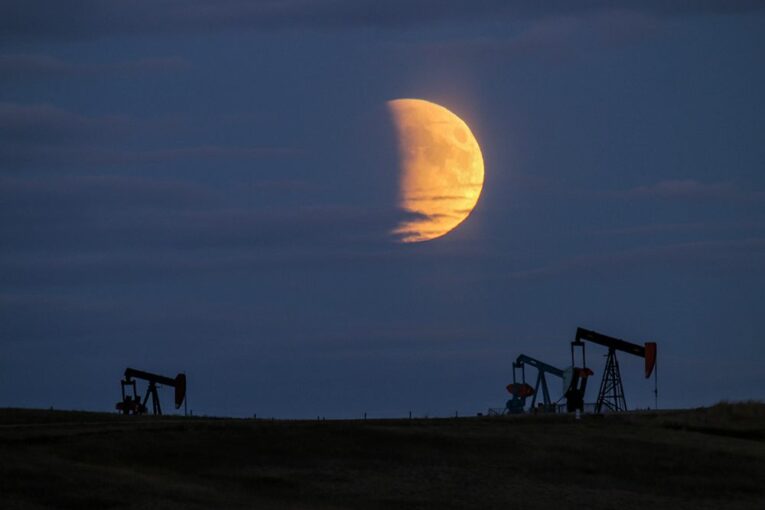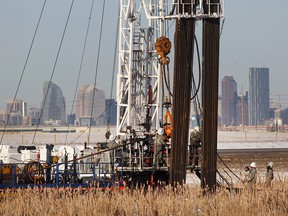
Black Friday took on a distinctly ominous tone with stock markets falling and benchmark U.S. oil prices sliding below US$70 a barrel to end the week, pummelling Canadian petroleum producers in the process.
The one-day tumble — oil fell by more than $10 a barrel on Friday — was sparked by reports of a new variant of COVID-19 emerging.
It ignited investor concerns and highlighted the vulnerability that surrounds global energy markets during the pandemic, along with Alberta’s expected economic rebound in 2022.
“It underscores how tenuous and uncertain a post-COVID economic recovery is,” Mike Holden, chief economist with the Business Council of Alberta, said Friday.
“You never know if something exactly like this could suddenly show up and throw a wrench in the gears.”
On the Toronto Stock Exchange, the S&P/TSX Composite Index fell 487 points, or 2.3 per cent, on Friday, while south of the border the Dow Jones Industrial Average lost 905 points.
The price of West Texas Intermediate crude declined by 13 per cent on the day to close at US$68.15 a barrel. In turn, the S&P/TSX Capped Energy Index was walloped, declining by about six per cent.
Shares in Imperial Oil and Suncor Energy dropped by six per cent, while MEG Energy Corp. and Baytex Energy were off by nine per cent.
“It tells you how much anxiety there is in the market,” said Murray Mullen, CEO of Okotoks-based Mullen Group Ltd., a trucking and logistics company that also offers specialized services to the natural resources and construction sectors.
“Somebody yelled fire and everybody ran for the exits today.”

The jitters were caused by the emergence of a new variant of COVID , which prompted Canada to put restrictions in place on travellers from several countries in southern Africa.
The new Omicron variant of concern was initially reported in South Africa this month and has a “large number of mutations, some of which are concerning,” said the World Health Organization.
It adds more uncertainty to the outlook for 2022.
More than 20 months into the pandemic, the global economy and energy demand have been recovering and OPEC+ countries are slated to meet next week to discuss future production levels.
Oil prices have risen by more than 43 per cent this year and Canadian petroleum producers are expecting strong commodity prices to continue in 2022, even with Friday’s sudden drop.
“It’s a massive over-reaction … this doesn’t change my view of the world at all,” said Surge Energy CEO Paul Colborne.
“It seems like a pretty big reaction for just a few hours of even knowing about it,” he said of the new COVID-19 variant.
Ian Nieboer, managing director of energy analytics firm Enverus in Calgary, said it appears the price of oil has exceeded fundamentals recently and new COVID concerns highlight the risk to a recovery in energy demand.
“It’s a pretty ugly day for the market in general, but for crude to move that much in one day is pretty wild,” Nieboer said.
“Clearly a lot of the buoyancy and support is getting let out of the balloon.”
For the Canadian oil and gas producers, 2021 has been an improving period marked by rapid debt repayment, higher share prices and growing profits.

Petroleum producers are now assembling their capital programs for next year amid growing expectations of modest spending increases if oil and natural gas prices hold. The Canadian Association of Energy Contractors expects the number of wells drilled next year will increase by 27 per cent across the country.
Energy consultancy Wood Mackenzie forecasts industry capital expenditures this year will hit $29 billion in Canada, with a modest increase in 2022 that will push the tally up to almost $31 billion.
“The restraint we’ve seen by operators is going to start to pay off,” said Wood Mackenzie analyst Scott Norlin. “Heading into 2022, I do think that the Canadian operators are pretty well poised.”
An increase in investment and strong commodity prices are expected to underpin Alberta’s economic recovery next year.
On Thursday, ATB Financial released a forecast showing the province’s economy will grow by four per cent in 2022.
A new survey of Alberta business leaders, to be released next week, shows a growing sense of confidence in the province, said Holden. Almost three-quarters of those surveyed expect to add staff within a year, while a similar number anticipate increased sales in their businesses.
However, rising inflation, the repercussions of flooding in British Columbia this month and the pandemic are potential wildcards.
“All else being equal, you would expect a strong 2022, but COVID specifically can change that in a heartbeat and it’s not something you can predict,” said Holden.
For Mullen, inflation is a more pressing economic concern than fears of another wave of COVID.
Consumers are still going to spend money and he expects energy-related work will pick up next year, although problems with supply chains — exacerbated by transportation issues in B.C. — could create headwinds.
But Friday’s market turbulence isn’t altering his outlook for 2022.
“It’s not affecting our planning one iota,” said Mullen.
“People are just gun-shy and have a lot of anxiety and they react to it. But it’s not going to impact how I think about where the economy is and how to handle it.”
Chris Varcoe is a Calgary Herald columnist.
You can read more of the news on source
